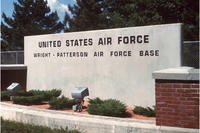Marines from the Corps' crisis response force in the Middle East were sent to recover an Air Force MQ-1 Predator drone after it went down in southern Iraq in June, the commander of the unit said Wednesday.
Col. Jay Bargeron returned in October after six months commanding Special Purpose Marine Air-Ground Task Force Crisis Response-Central Command in the Middle East. The 2,300-man unit operates in six countries across the Middle East, but was largely tasked with supporting the coalition fight against the Islamic State in Iraq and Syria, or ISIS, during the recent deployment.
One of the task force's key jobs was Tactical Recovery of Aircraft Personnel, a task that sometimes keeps Marine V-22 Ospreys airborne and at the ready while other units conduct air strikes over Iraq and Syria.
When the Predator went down in an isolated location due to mechanical issues, Bargeron said the Marines were called in to retrieve sensitive items and destroy the rest of the aircraft. The mission, he said, went just like the Marines had rehearsed.
"We were asked to go and retrieve some sensitive items off the [unmanned aircraft system]," he said. "We did that without incident … there weren't any civilians or other folks at all around there. We retrieved the sensitive items and we came back."
A traditional TRAP force of two aircraft and a platoon-sized element of Marines conducted the mission, Bargeron said.
The downed Predator was one of a series of drone mishaps since the fight against Islamic State militants began. In October, after his rotation of Marines had left the region, two more Predators went down in Turkey in separate incidents. But while task force Marines maintain aircraft recovery as a primary capability, the decision of which forces to send in for retrieval missions is made on a case-by-case basis, he said.
"It's all centrally controlled," Bargeron said. "The combined air ops center would take a look at what happened, what do we need to do, who's the best force to do it."
During the task force's deployment, which began in April, the unit also conducted airstrikes over Iraq and Syria "almost daily," he said, completing roughly 600 sorties with its element of F/A-18 Hornets.
The unit also provided security at the Al-Asad air base in western Iraq and assisted in re-opening Al-Taqaddum air base to the east after President Barack Obama announced he was sending more troops into Iraq.
"We had about 160 Marines from 3rd Battalion, 7th Marines trained and ready for the most austere conditions possible," Marine officials said in a statement. "We had MV-22s from VMM-165, ready and waiting on the airfield with the operational reach and speed to get in and out of Al Taqaddum quickly. SPMAGTF Marines created and held a foothold for follow on forces so they could begin the infrastructure and logistical build up necessary for base sustainment."
Separate advise-and-assist teams of Marines provided mentorship and advice to Iraqi forces, who were planning an offensive to take back the population hub of Ramadi from ISIS militants during the deployment. Iraqi security forces formally launched the offensive on Nov. 26.
Bargeron said Marine advisers would sit down with Iraqi military leaders and examine maps, intelligence and enemy positions and help them put together plans to achieve their military objectives.
"It's a really sit-down, knee-to-knee kind of relationship, helping them plan their operation," he said.
While some have questioned the motivation of the Iraqi forces, Bargeron said their position required them to be committed.
"They've been surrounding Ramadi for months now," he said. "My observation was, it takes a fair amount of motivation to keep forces in the field facing the enemy for months and months."
-- Hope Hodge Seck can be reached at hope.seck@military.com. Follow her on Twitter at @HopeSeck.
Related Video:





























